Rotary phones. This whole entry came about because of the black rotary phone on Laurie’s chest of drawers in John Carpenter’s Halloween.
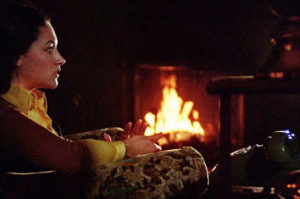 Lately I’ve found myself focusing on phones in older horror movies. The
Lately I’ve found myself focusing on phones in older horror movies. The 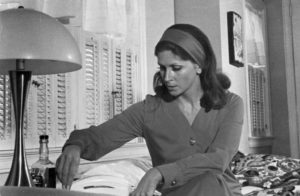 black rotary phone in Black Christmas that delivers deranged phone calls from a psycho killer to the helpless sorority girls. The white princess phone on the bedside table of the protagonist in George Romero’s Season of the Witch. Forget the phone in Scream, that movie’s too young. It’s just the phones in horror films before 1982, approximately.
black rotary phone in Black Christmas that delivers deranged phone calls from a psycho killer to the helpless sorority girls. The white princess phone on the bedside table of the protagonist in George Romero’s Season of the Witch. Forget the phone in Scream, that movie’s too young. It’s just the phones in horror films before 1982, approximately.
I wish I had something deeper to root to this feeling of pleasant sadness when I see rotary phones in films, especially horror films. This will not be an erudite discussion along the lines of analyzing the meaning of the James Ensor poster in Laurie’s room. It’s just me explaining, as insane as it sounds, how older horror films trigger memories of people in my life who are gone and the places where they lived. It wasn’t a simpler time because life is always complex no matter what. But it was a more visually consistent time, when memories of people and places were not so subject to change and media influence as they are in contemporary films. It was also a time when a person could have an unassailed inner life if they wanted one, and they didn’t have to go full Unabomber to accomplish it.
 For decades, my grandparents had the same telephone, a black rotary phone that sat on a side table in their dining nook. They also had an old fashioned phone where the microphone was attached to the wall with a spool-shaped receiver you held up to your ear. It wasn’t used but it remained on the wall anyway. I’ve always wondered who got that phone when my grandfather died.
For decades, my grandparents had the same telephone, a black rotary phone that sat on a side table in their dining nook. They also had an old fashioned phone where the microphone was attached to the wall with a spool-shaped receiver you held up to your ear. It wasn’t used but it remained on the wall anyway. I’ve always wondered who got that phone when my grandfather died.
My own childhood home had a basic wall-installed phone with a traditional handset that stayed in that place, unchanged, for the ten years we lived there. The cord was stretched out from being pulled across the kitchen so we could talk while we washed dishes or tried to stretch it into a bedroom for privacy. I didn’t hate answering the phone back then. Even though telephones brought bad news, when I was young a telephone ringing generally meant something good. A friend wanted to chat, a boy wanted to ask me to a dance, someone wanted me to go bike riding with them. As I got older, sometimes a ringing phone meant someone needed me to cover their after school shift at Michaels, but uniformly, a phone call was nothing more than an invitation to speak to an actual human being about something grounded to a shared reality.
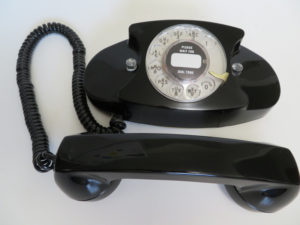 I miss rotary phones. I especially miss phones where the buttons or dials are not housed within the handset, ensuring a life free of butt dials and accidentally handing up when you shift the phone as you speak. I miss them because they seem like a symbol of the last time in history when technology changed slowly enough that the phone you used in grade school was the same one you used in high school. I often feel like we as a world are descending into absolute social chaos because communication technology has and continues to out pace our capacity to adapt.
I miss rotary phones. I especially miss phones where the buttons or dials are not housed within the handset, ensuring a life free of butt dials and accidentally handing up when you shift the phone as you speak. I miss them because they seem like a symbol of the last time in history when technology changed slowly enough that the phone you used in grade school was the same one you used in high school. I often feel like we as a world are descending into absolute social chaos because communication technology has and continues to out pace our capacity to adapt.
In Michelle Stacey’s book The Fasting Girl, which is about Mollie Fancher, a girl who was believed to have lived for decades without eating, she speaks about how the zeitgeist at the time was one of psychological chaos. Why? Because suddenly people could move from one side of the country to the other via the Transcontinental Railway in a matter of a few days. Suddenly letters could arrive to the recipients in other states within the same month they were sent. Then the telegraph enabled people to deliver urgent messages in a matter of hours. This rapid expansion of technology caused people to experience a paradigm shift that deeply affected their mental states.
How could one help being nervous in this mind-expanding universe, in which the emerging universe would threaten to change unrecognizably in the course of a generation? How could one avoid the ambient fear of all the noise and speed and light and steam? Humans had never been exposed to such phenomena; they had not learned yet to tolerate them.
Stationary phones with dials were wholly replaced with touch tone phones largely in the 1980s, though they persisted until modern life made it impossible to use them anymore. I have a better chance of explaining the origins of the universe than I do explaining or even understanding the technology that finally killed off rotary phones (beeps are involved, I think), but it stands to reason that if the possibilities of train travel and the promptness of the telegraph caused people to experience anxiety that manifested in psychological illness, what has happened to us all in the decades between rotary phones and these card-pack-sized devices that allow us to be reached at any moment via voice, text, social media, or email while they also give us the capacity to discover any fact from any place in history in a second. We can watch our lives fall apart into utter chaos when someone finds an old Tweet and decides we are fascist racists because we think lox is gross. We can listen to any piece of music, watch any movie, read any book, all the while avoiding direct human contact. And maybe that’s a good thing, because lord knows I don’t want to talk to anyone ever. But it’s undeniable that phones have now made it almost impossible to be alone, calm, and without the expectation that at any moment you may find yourself texting to several people at once as another scam call from the Fraternal Order of the Police gets sent to your voice mail.
Part of me knows I fixate on rotary phones because it’s a mental link to people like my grandparents. I also fixate on them because they’re stylish, because they make horror movie plots easier to create, because I despise speaker phones. But I also fixate on them because the horror they could convey was concentrated and specific. Nasty prank or obscene calls were of course a problem, but some asshole calling and hanging up or breathing heavily over the phone seems so much more… welcome than picking up a glass and metal device that fits into your hand and realizing that Twitter is coming for you, or that some weirdo has taken to using your phone number on credit card applications and skipped out on payments, or that a device that has access to all your data fell out of your pocket without you noticing and your best possible hope is that your thousand dollar ball and chain is in a toilet somewhere, utterly ruined, and not, say, in the hands of a teenager who can in seconds steal all your money. In Halloween, the worst thing that happened with a phone was when Lynda was strangled with a phone cord, and even then it was sort of okay because it meant we no longer had to listen to her annoying, continual giggling. And wouldn’t you rather go quickly via cord strangulation than the slow death of calling your credit card companies begging them to cancel your card after it is maxed out somewhere in Dubai?
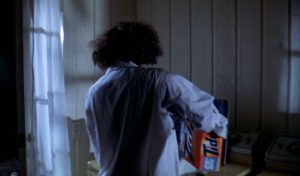 If this sounds insane it probably is but I miss the homes and the things people used in their homes before the Internet came, and for some reason horror movies drive that home to me in a way other films do not. Sometimes it’s not just the phones. I remember the kitchens in Halloween as well, especially the kitchen at Lindsey’s home. Those kitchens were not showplaces influenced by the social media that drives so many of us to alter our homes into minimalist nightmares with kitchens with bare granite counters upon which many a smoothie is blended but meals seldom cooked. I know modern front loading washing machines are more water and energy efficient, but I hate them because clothes never get as clean as they do with top loaders with agitators, and the laundry room Annie used in Halloween when she got butter all over herself reminded me of the machines we used all throughout my life. Then seeing that cardboard box of Tide with maybe ten loads of washing powder… Did Costco exist back then? And if it did, would anyone in the seventies have bought a 108-pod value pack of detergent only later to rush their teen son to the ER because he ate several of them during a TikTok challenge? And would my grandparents have had a chance in hell of even understanding the preceding sentence?
If this sounds insane it probably is but I miss the homes and the things people used in their homes before the Internet came, and for some reason horror movies drive that home to me in a way other films do not. Sometimes it’s not just the phones. I remember the kitchens in Halloween as well, especially the kitchen at Lindsey’s home. Those kitchens were not showplaces influenced by the social media that drives so many of us to alter our homes into minimalist nightmares with kitchens with bare granite counters upon which many a smoothie is blended but meals seldom cooked. I know modern front loading washing machines are more water and energy efficient, but I hate them because clothes never get as clean as they do with top loaders with agitators, and the laundry room Annie used in Halloween when she got butter all over herself reminded me of the machines we used all throughout my life. Then seeing that cardboard box of Tide with maybe ten loads of washing powder… Did Costco exist back then? And if it did, would anyone in the seventies have bought a 108-pod value pack of detergent only later to rush their teen son to the ER because he ate several of them during a TikTok challenge? And would my grandparents have had a chance in hell of even understanding the preceding sentence?
I guess rotary phones in horror movies are a symbol of a calmer, less frenzied life. You go a hundred and fifty years back and those lives seem absolutely foreign to most Westerners. No cars, no electricity, indoor bathrooms were thin on the ground and no phones at all. But 1978, when Halloween was released, is not much different than today. Cars, air conditioning, easy means of communication – even the same damn snacks down to quickly prepared popcorn. But the grinding stress of the way phones now shape our lives is absent. Laurie didn’t need to worry about the crops coming in so her village wouldn’t starve, but she also didn’t have to worry about being accessible every moment to anyone who wanted to reach her. She only had to worry about one maniac who never spoke a word.
And it’s not like I’m looking back at the 1950s-1980s and proclaiming them “better days” or harking back to my childhood and insisting that everything is going to hell these days. As I said, life is a hassle no matter when you are born. I personally think Millennials and Gen-Z have it worse psychologically than I did as a kid. I guess I am just saying that all things considered I prefer the hassles common to the era of the black rotary phones than the hassles of Little House on the Prairie or those of the Internet age.
When I see black rotary phones, I feel an exquisite loneliness. The people and the time those phones represent are gone forever and I miss them. I miss the days when homes were not social media driven showplaces and people made Jiffy Pop over the stove, when phones rang and people answered them even though they had no idea who was calling, when no one except the killer had any reasonable expectation of getting you on the phone at two A.M. And when you threw your phone at the man in the mask, it probably hurt a lot more than hurling an iPhone at him.
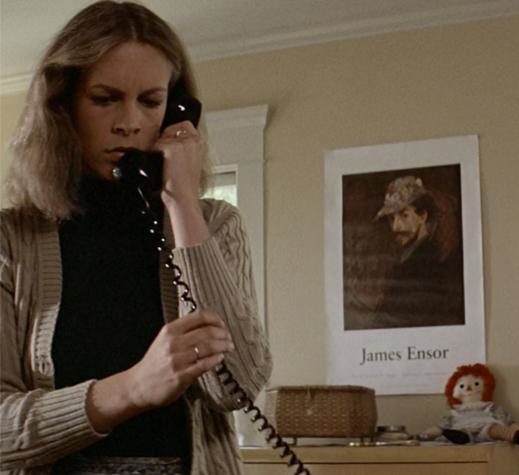
Everything, I’ve always wanted to say about telephones, and more.